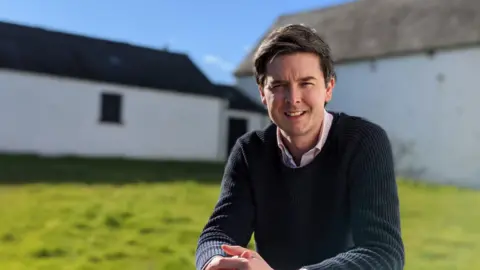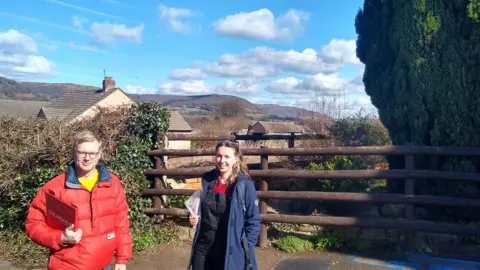Elections 2022: What is it like to win a seat by coin toss?
 Tomos Davies
Tomos DaviesAfter months of campaigning, those standing for election hope nothing is left to chance.
But for candidates in two different councils in this month's local elections, their fate was decided by the flip of a coin.
In one instance - Carmarthenshire's Bigyn ward - two Labour candidates went head-to-head, or rather, heads or tails.
But the other, Llanfoist Fawr and Govilon in Monmouthshire, was crucial in deciding the outcome of who would control the council.
Bryony Nicholson from the Labour Party and Tomos Davies of the Conservatives, both woke up on the morning of 6 May not sure what to expect.
Mr Davies, whose party previously controlled Monmouthshire council but were losing seats across the UK, was anticipating a close result.
"I woke up on Friday, saw the national picture, saw the national swing against us nationally, and thought it may scupper our prospects locally or there would be at least a string of close results in Monmouthshire," he said.
"But never had I thought it would be this close."
Mr Davies, who could not be at the count, said the national picture had left Conservative colleagues "spooked" but he was "at peace" with potentially missing out.
But for Ms Nicholson, being at the count meant she saw just how close the results were.
She said: "We knew we would be around the first to be counted because we were a two-seat ward. We got there about 01:45 and we were told they were going to announce it any minute."
But three-and-a-half hours later, after several other seats had been decided, they were still waiting.
 Bryony Nicholson
Bryony NicholsonMs Nicholson was told her colleague, Ben Callard, had won the first seat, but the remaining three candidates fighting for the last seat were split by a razor-thin margin. So the recounts began.
"Towards the end I found it really difficult to be near the table," she said.
"You can see the votes [being counted]. People from both parties were counting along with the votes."
Mr Davies, at home, said he had been getting contradictory messages from colleagues at the count as the result seemed to swing between the two candidates and Hannah Jarvis, the other Conservative runner, who ultimately finished just three votes behind.
Eventually, after three recounts and 679 votes each, Mr Davies got a text from the party's agent at the count.
"Heads or tails?"
 Bryony Nicholson
Bryony NicholsonBut it was not his call to make, as Ms Nicholson explained.
"The returning officer suggested I called it as I was the one there," she said.
She called heads. It was tails.
She said: "I'm really glad I called it because there's nothing else for me to get stuck on in my recovery [from missing out on the seat], but I'm not going to look back on it."
The result meant Labour ultimately won 22 of 46 seats, just short of a majority.

What are the rules in the event of a tie?
Guidance issued to returning officers for elections in Wales states if two candidates are tied for "the only or last seat to be allocated, you must decide between the candidates by lot".
The method of drawing lots is then up to the returning officer, who oversees the election.
 Getty Images
Getty ImagesIt is not the first time major events have been decided by chance, both in the world of politics and outside.
There was one in a local election in England in 2017, and, in 2016, Hillary Clinton beat Bernie Sanders in six separate coin tosses in Iowa's Democratic caucuses.
In 1968, before penalty shootouts were commonplace, Italy captain Giacinto Facchetti called a coin toss correctly to give his team victory over the Soviet Union in the semi-finals of the European Championships. They would go on to win the tournament.

"For a majority to be decided by chance is a bit ridiculous. Everyone was as bemused as each other," Ms Nicholson said.
"To have carried out such a successful campaign and done so much… to have it come down to a one-of-two.
"I'm really glad that I didn't know that it was that seat that the majority was resting on."

Mr Davies said he would have picked tails, telling the agent at the count "tails for Wales never fails", but was elected to the final seat ahead of Ms Nicholson after she called incorrectly.
He said: "[They were] quite exceptional circumstances. I'm not aware of three recounts and then a coin toss, it's all very surreal and to be tossing for the majority of the council added a level of suspense. I'm sure it'll be a pub quiz question in years to come.
"It added to the theatre and the spectacle, clearly that generated a fair bit of interest, but on a human level it was no way to settle an election and was deeply unsatisfactory.
"It was desperately unfortunate for Bryony and she showed so much dignity and honour."
The two have spoken since the result, with Ms Nicholson sending "a very generous message of congratulations" to Mr Davies.
Ms Nicholson said she would prefer to see a proportional representation system in the future, but both had the same message after their fate was decided by chance.
"Every vote counts."
